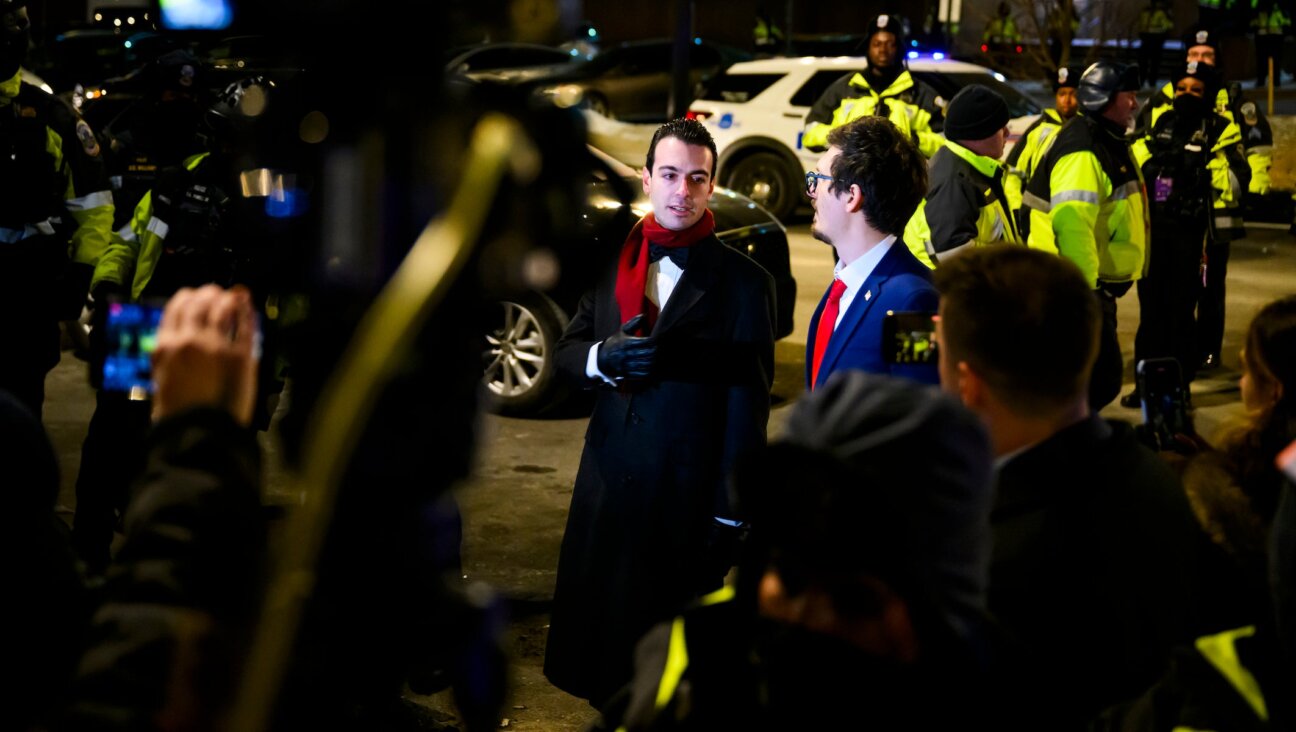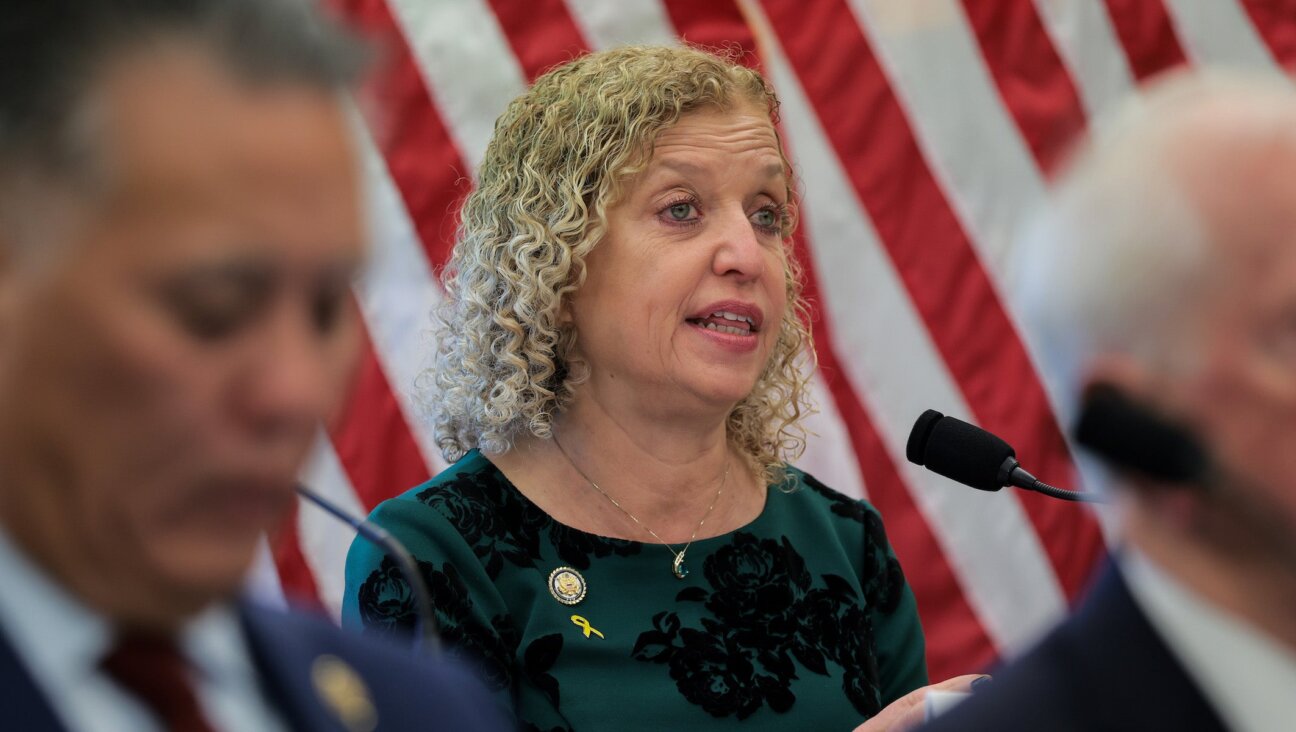Brooklyn bookstore parts ways with worker who canceled event over pro-Israel rabbi as moderator
‘It’s an outrage,’ says Rabbi Andy Bachman after event with author Joshua Leifer axed

Joshua Leifer, center, with Rabbi Andy Bachman, right, outside Powerhouse Arena after an event for Leifer’s book was canceled. Photo by Joni Kletter
A public conversation between Joshua Leifer, the author of Tablets Shattered, a new book on Jewish identity, and Rabbi Andy Bachman was scheduled to take place Tuesday evening at the Powerhouse Arena bookstore in Brooklyn.
But before the event was set to begin, according to Leifer and confirmed by the owner of the bookstore, the employee running the event began expressing concerns about Bachman, a progressive whose comments defending Israel make him an outlier in those spaces.
When Leifer arrived, there was already a sign on the window that said the event had been canceled. When he sought an explanation from the employee, she told him, “We don’t want a Zionist on our stage,” according to a recording of the conversation Leifer shared with the Forward.
Less than an hour before the launch event for my book Tablets Shattered, a conversation with Rabbi Andy Bachman, @powerHouseBooks in Brooklyn told me they were unwilling to host the conversation with Andy because they would not permit a Zionist on the premises.
— Joshua Leifer (@joshualeifer) August 21, 2024
The bookstore’s owner, Daniel Power, said in an interview that the employee was acting alone and was no longer employed there as of Wednesday.
“All she was to do was babysit an event,” Power, 62, said. “Absolutely no one here can get their heads around what the heck she thought she was doing.”
Several Jewish leaders denounced the incident as antisemitic, including Rabbi Jill Jacobs, a prominent progressive Jewish community leader, who called the cancellation “completely ridiculous.”
“It is antisemitic to demand that Jews disavow Israel before being allowed into your space,” Jacobs said on X. Bachman said he planned to file complaints with the city’s Human Rights Commission and the Anti-Defamation League.
“Jews, like every other nation on earth with a homeland, have a right to self determination, and that’s what makes me a Zionist,” he said. “I don’t agree with the policies of the current government, I don’t agree with the way they’re waging the war. That doesn’t mean I disavow or deny Israel’s right to exist.”
‘An outrage’
Power says the first sign of trouble came via a one-star review of the store on Facebook that night. It mentioned Tuesday’s event had been canceled, so he called the employee assigned to staff it to learn what happened.
He says the employee, Hannah Hayes, told him that she had Googled the moderator and found that he had been booed as a panelist at a previous event.

She was likely referring to a screening of the controversial movie Israelism at Hunter College last year, at which Bachman — formerly the rabbi of Congregation Beth Elohim, a Reform synagogue in Park Slope, and the founder of the progressive group Brooklyn Jews — was heckled for making comments defending Israel. The movie is about two American Jews who were raised to support Israel but who have changed their views. Audience members at the event said Bachman came to the screening with his own agenda.
Anticipating further controversy, Hayes told Power she raised the issue with the book’s publicist, Hannah Poole, who offered to look for a replacement. Poole eventually came back and said she was calling off the event, according to Hayes.
Poole did not respond to a request for comment.
Hayes did not mention Zionism when Power first asked her about the cancellation, he said. He didn’t find out about her comments until he read them in the New York Post. “I’m like, ‘What the f—?’” Power said. “And she goes, ‘I might’ve said it, I don’t remember.’”
Hayes had already planned to make Aug. 28 her last day working at the store, Power said. But when Power summoned her to the store Wednesday in order to fire her in person, she quit on the spot.
Hayes did not respond to a request for comment.
An editor at the publisher, Penguin Random House, did not immediately respond to requests for comment.
Leifer rejected Hayes’ claim that Poole had called off the event, saying that her refusal to allow Bachman made any question of who canceled it purely academic.
“That was her position and she asserted it quite stridently,” Leifer said. “And that meant the event that we had planned and that we had agreed about couldn’t happen, so she unilaterally prevented the event from happening.”
The story of the event cancellation was widely reported on both Jewish and mainstream media, including in The New York Times. That led to a spike in sales for the book, which was published the day before the talk was called off. It’s now the No. 1 book in the Amazon’s “History of Judaism” and “Jewish Social Studies” categories, and has zoomed from a ranking of 58,133 overall in the Kindle store to 1,708 in the Books category overall.
The term ‘Zionist’
Controversy over the Israel-Hamas war has embroiled other literary spaces since Oct. 7. A viral list targeting “Zionist” authors circulated online, a Jewish sponsor of the National Book Awards withdrew from the ceremony due to an effort to call for a ceasefire, and PEN America canceled an annual festival due to disputes over the war.
The term “Zionist” has become pejorative in parts of the American left, with progressive groups, business owners and college students actively seeking to exclude “Zionists” from public spaces. An overwhelming majority of American Jews identify with Israel, polls have shown. Ironically, Leifer’s publishing debut — whose full title is Tablets Shattered: The End of an American Jewish Century and the Future Of Jewish Life — explores that dynamic, the author said in an interview.
Leifer called Hayes’ actions “effectively antisemitic.”
“There’s an ideological litmus test that’s being applied specifically to Jews in order to appear on stage at this event,” he explained. “Given the reality that most American Jews identify in some way as Zionists, saying that there’s no place for Zionists on stage effectively bars most Jews from participating in the space.”
But if it was offensive, it was also familiar. Leifer, a vocal critic of Israel who previously worked as a contributing editor at Jewish Currents, a leftist Jewish publication, said his views decrying antisemitism in critiques of Israel have become increasingly unwelcome in progressive Jewish spaces.
“I had a suspicion that something like this would happen,” Leifer said, “but I didn’t think it would be this thing specifically that would be the trigger for it.”
Power, who said he had been trying unsuccessfully to reach Leifer through his publisher, wanted to convey that the bookstore did not stand by its employee’s actions. Zionists had spoken there in the past, he said, and everyone was welcome inside regardless of their views. In lieu of rescheduling the event, which Leifer said didn’t interest him, Power hoped to bring Bachman to speak there soon.
Leifer is scheduled to discuss the book with Forward editor-in-chief Jodi Rudoren on Sept. 19 at Watchung Booksellers in Montclair, New Jersey.
“We accept and embrace all sorts of positions, because we are a store, and it’s like, we sell ideas, we sell books,” Power said. “It’s not our position to say only this kind is allowed, not that kind.”
This story has been updated to include quotes from Joshua Leifer and Daniel Power.
JTA contributed to this story.

























